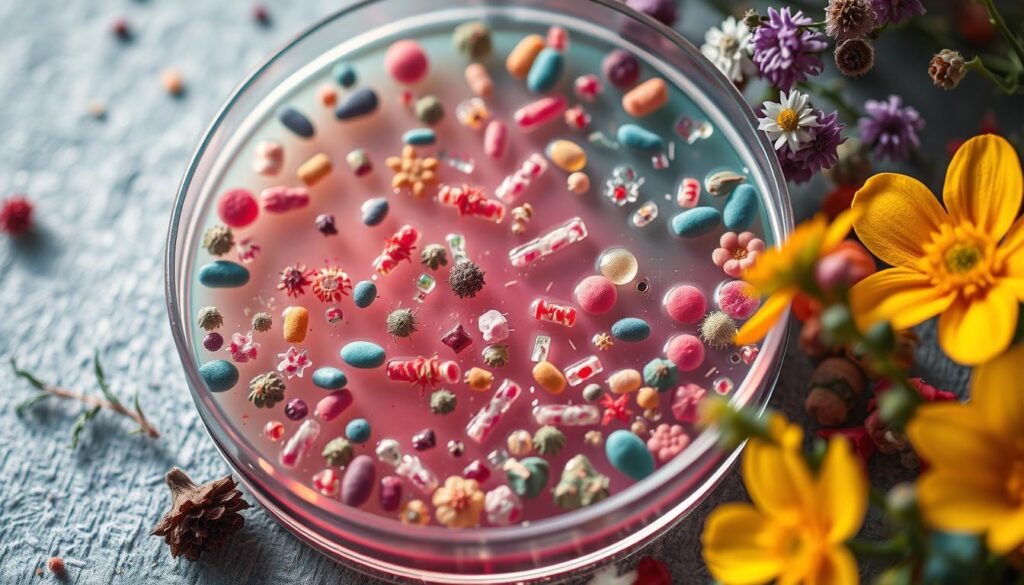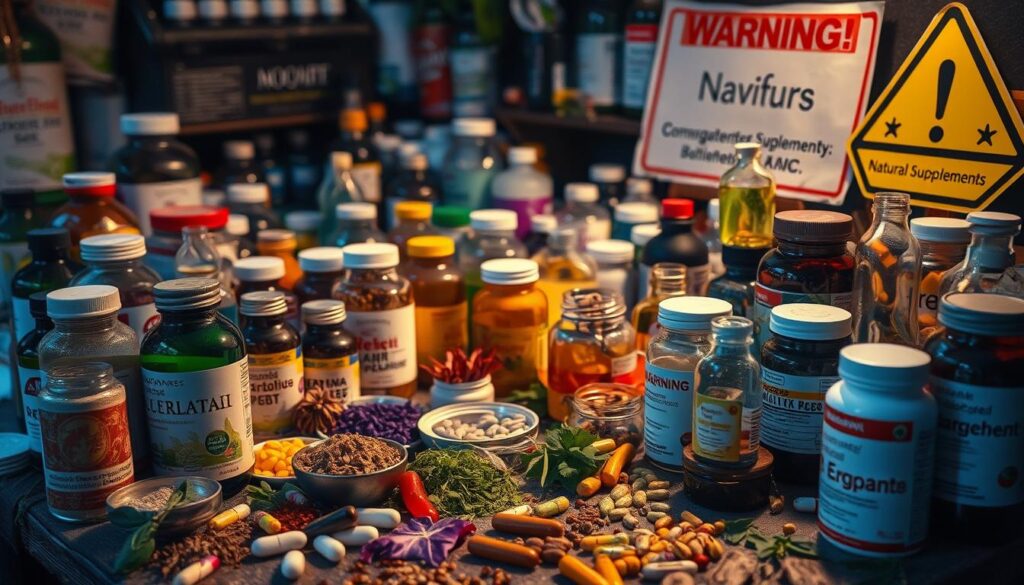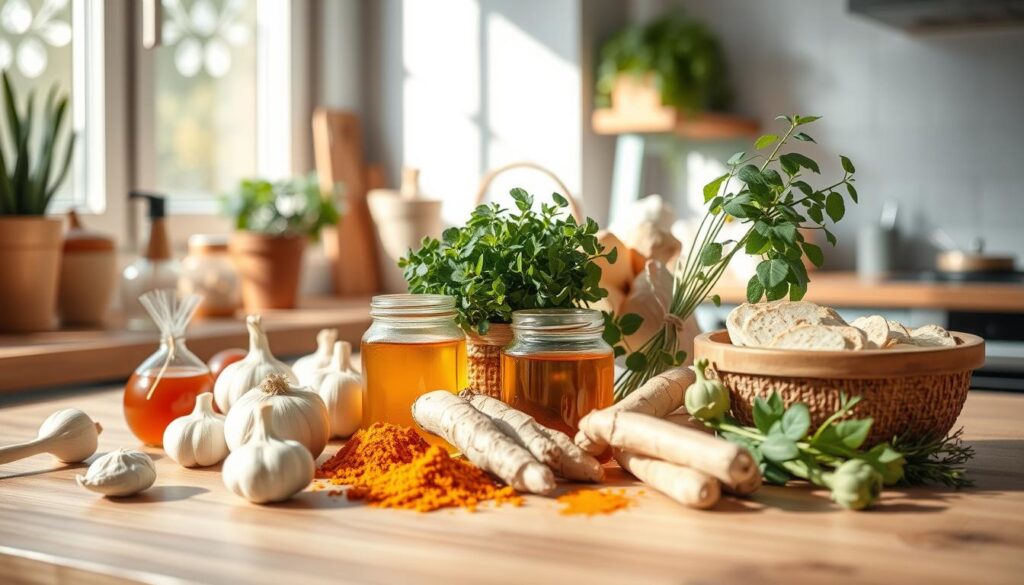When you’re not feeling well it’s easy to turn to herbal teas or supplements. They claim to fight bacteria. But is using natural antibiotics safe and effective? The truth might shock you.
Some plant based compounds might kill bacteria in labs. But they shouldn’t replace doctor’s advice. The quality and safety of herbal supplements can vary a lot. Natural doesn’t always mean it’s safe for you.
Using natural antibiotics yourself can be risky. It might lead to wrong diagnoses or misuse. It could also harm you by mixing with other medicines.
Key Takeaways
- Natural antibiotics and antimicrobials can be unpredictable and unregulated
- Self-treatment can lead to misdiagnosis and improper use of natural remedies
- Herbal medicines can interact with prescription drugs and have detrimental effects
- Consulting a healthcare provider is crucial for safe and effective treatment
- Overuse of any antimicrobials, natural or synthetic, can contribute to antibiotic resistance
Understanding Natural Antibiotics and Antimicrobials
Natural antimicrobials can kill or slow down the growth of tiny organisms like bacteria and viruses. They are different from antibiotics made by doctors. Plants like echinacea elderberry, and cranberries are examples of natural antimicrobials.
These substances help keep the body healthy and fight off mild illnesses. They do this by creating a good environment in the body or by boosting the immune system.
Defining Natural Antimicrobial Compounds
Natural antimicrobial compounds come from plants, animals, or other natural sources. They can stop or kill microscopic organisms. You can find them in essential oils plant extracts, and even some foods.
Common Types of Natural Antibiotics
- Garlic Studies show garlic can fight bacteria showing its antimicrobial properties.
- Myrrh Myrrh extract can kill common pathogens like E. coli and Candida albicans, research finds.
- Thyme Thyme essential oil is better at killing bacteria than lavender making it a strong antibiotic.
- Oregano Oregano essential oil’s carvacrol helps the body heal studies say.
How Natural Antimicrobials Work
Natural antimicrobials help the body fight infections in different ways. Some make it hard for microscopic organisms to survive. Others help the immune system fight off mild illnesses.
In some cases natural antimicrobials work as well as chemical antibiotics in treating certain conditions.
The Growing Concern of Antibiotic Resistance
Antibiotic resistance is a major health crisis worldwide. Bacteria can change and resist antibiotics, creating superbugs. This has led to more deaths sickness, and higher healthcare costs globally.
Using antibiotics too much and incorrectly is a big problem. In many places especially poor countries people can’t afford healthcare. They often treat themselves with antibiotics without knowing the dangers.
The World Health Organization warns of 10 million deaths by 2050 due to antibiotic resistance. This is especially true in countries like China Brazil South Africa, and Libya. These places face a big challenge because their medicine has grown faster than their ability to fight antibiotic resistance.
| Key Insights | Statistics |
|---|---|
| Self-medication with antibiotics is a common practice globally | Self-medication is a widespread practice especially in developing nations Majority of the population is uninformed about the harmful consequences of antibiotic resistance |
| Antibiotic resistance is a growing public health crisis | WHO estimates 10 million deaths attributed to antibiotic resistance by 2050 Antibiotic resistance is a major public health crisis in high-middle income countries |
| Factors contributing to antibiotic resistance | Overuse and misuse of antibiotics including self-medication
Lack of access to affordable healthcare in developing countries |
To solve this crisis we need a few things. Better education more healthcare access, and stricter rules on antibiotics are key. It’s important for people to know the dangers of treating themselves and to see a doctor for health issues.

Read more: The Natural Antibiotic You Should Know About
Why You Shouldn’t Self Treat With Natural Antibiotics
The idea of using natural antibiotics might seem good. But it can be dangerous. Without a doctor’s advice you might treat the wrong thing. This could make your health problem worse.
Another big problem is harmful interactions with other medicines. Herbal remedies, like natural antibiotics, can mess with your prescription drugs. This is especially risky if you’re taking many medicines or have health issues.
Using natural antibiotics can also upset your gut’s balance. These natural treatments harm both good and bad bacteria. This can cause stomach problems, nutrient shortages, and other health issues.

In the end, the dangers of using natural antibiotics are too great. Always see a doctor for health problems. They can give you the right treatment and advice.
The Unregulated Nature of Natural Antibiotics
Conventional medicines go through strict testing and FDA approval. But natural antibiotics and herbal supplements don’t. This means their quality, safety, and how well they work can vary a lot. People should be careful when thinking about using these unregulated supplements as natural antibiotics.
Natural antibiotics don’t have to go through the same tests as prescription drugs. So we don’t really know how strong, pure or consistent they are. Some might not even have what they say they do or they could be full of bad stuff. This lack of control can be risky for users.
The FDA also doesn’t check the claims made by natural antibiotic supplement makers. These products might say they’re much better than they really are. But many natural antibiotics haven’t been proven to work well.
Because natural antibiotics aren’t regulated it’s very important to talk to a doctor before using them. Using them without a doctor’s advice can be dangerous. It could lead to bad reactions with other medicines or health problems.

Read more: 7 Most Powerful Natural Antibiotics
The lack of regulation and quality control in the natural antibiotic market is a serious concern. Consumers must be vigilant and consult with healthcare providers to ensure they are making informed decisions about their health.
When Natural Antimicrobials May Be Appropriate
Conventional antibiotics are key for serious bacterial infections. But natural antimicrobials can help in some cases. They can be used to prevent infections support treatment or manage mild illnesses. Always talk to a healthcare provider before using them.
Preventive Measures
Natural antimicrobials can help keep your body healthy. They can prevent infections from starting. Using them with lifestyle changes and immune-boosting practices is a good strategy.
Supporting Conventional Treatment
For minor infections like early sinus infections or bronchitis natural antimicrobials might be recommended. They can help your body fight off the infection without needing antibiotics right away.
Mild Illness Management
Natural antimicrobials can help with mild illnesses by easing symptoms and aiding in recovery. But it’s important to get advice from a healthcare provider. They can help ensure you’re using them correctly and watch for any side effects.
The use of natural antimicrobials should be considered a complementary approach not a replacement for professional medical care. Proper diagnosis and guidance from a healthcare provider are essential.

Read more: Wellness Is More Than Weight
Safety Concerns and Contraindications
When it comes to natural antibiotics and antimicrobials, safety is key. These remedies aren’t for everyone. Pregnant or breastfeeding women people on certain medications, and kids should be careful.
Some natural remedies can affect how well other medicines work. For example garlic supplements might make bleeding more likely. Echinacea, a popular immune booster could mess with drugs that weaken the immune system.
Always talk to a doctor before trying natural antimicrobials. They can tell you if it’s safe for you. They’ll consider your health history and current situation.
Natural Remedies and Vulnerable Populations
- Pregnant or breastfeeding women should avoid natural antibiotics because we don’t know their safety.
- Children might be more affected by natural remedies. Always check with a pediatrician first.
- People with ongoing health issues, weak immune systems, or on regular meds should talk to their doctor before using natural antimicrobials.
Potential Interactions and Contraindications
| Natural Remedy | Potential Interactions | Contraindications |
|---|---|---|
| Garlic | Blood thinners, HIV/AIDS medications | Bleeding disorders, upcoming surgery |
| Echinacea | Immunosuppressant drugs | Autoimmune disorders, organ transplants |
| Goldenseal | Diabetes medications, antidepressants | Liver disease, high blood pressure |
| Licorice Root | Diuretics, blood pressure medications | Kidney disease, heart conditions |
Always get medical advice before using natural remedies. A doctor can help you use them safely and effectively.
The Importance of Professional Medical Guidance
Using natural antibiotics needs professional advice. Doctors, especially those in integrative or functional medicine, know a lot about natural remedies. They help with diagnosis, treatment plans, and watching for side effects or interactions.
Getting medical advice is key. It makes sure natural antimicrobials work well with other health strategies. This way they offer the most benefits with the least risks.
Role of Healthcare Providers
Doctors are key in using natural antibiotics. They check the condition, pick the right natural remedies, and watch how you react. Their knowledge ensures natural antimicrobials are used right and safely.
Working with doctors helps you make smart choices. You can add natural options to your health care plan.
Proper Diagnosis and Treatment Plans
Getting the right diagnosis and treatment plan is vital for natural antibiotics. Doctors figure out the cause of the problem and create a plan that might include natural remedies. This approach treats the root cause and helps your body heal naturally.

Seeking professional medical guidance is the key to using natural antibiotics safely and effectively. Healthcare providers can help navigate the complex landscape of natural remedies and develop a personalized treatment plan that optimizes their benefits.
Common Misconceptions About Natural Antibiotics
Many people think natural antibiotics are always safe and better than regular ones. But this isn’t true. Natural doesn’t automatically mean safe or effective.
One big myth is that natural antibiotics don’t cause antibiotic resistance. Sadly, this is not true. Natural remedies can have strong antimicrobial compounds. If used wrong they can also lead to resistant bacteria. Like synthetic antibiotics natural antibiotics need careful use and a doctor’s advice.
Another myth is that natural remedies can replace doctor’s antibiotics for serious infections. While they can help with mild cases or as a preventive they’re not for all infections. Serious infections often need the strong action of regular antibiotics.
- Natural does not always mean safe – natural remedies can be just as potent as synthetic drugs
- Natural antibiotics can contribute to antibiotic resistance if used improperly
- Natural remedies are not a substitute for prescription antibiotics, especially for serious infections
It’s key to know the limits and right uses of natural antibiotics and antimicrobial alternatives. They can be useful but shouldn’t replace doctor’s care. Always talk to a healthcare provider for safe and right treatment, whether it’s natural or regular.
Conclusion
Natural antibiotics and antimicrobials might offer some benefits. But using them without medical supervision is risky. These products are not regulated, can interact harmfully, and might lead to misdiagnosis.
Getting professional medical advice is vital. It helps understand their limits, risks, and when to use them. This way you can use natural antibiotics safely and effectively.
Always talk to a healthcare provider before adding natural antibiotics to your routine. This step is crucial to avoid the dangers of self diagnosis. It ensures your health and safety.
Being cautious and getting medical guidance lets you use natural antibiotics wisely. It’s important to balance their benefits with conventional medical treatment. This approach keeps your health safe and sound.





